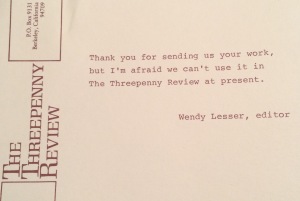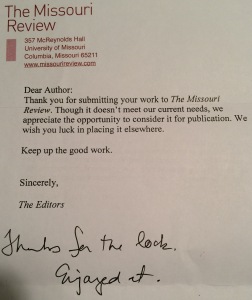I got a nice one the other day:

I was in a great mood all week. “Nice writing.” A compliment from an editor, though not as exciting as an acceptance, is still wonderful. When I do submit to the Tampa Review again (probably in a few months), I will write a note to the editor and perhaps even include a copy of this note as a reminder that I was invited to submit material again. These notices with personal comments are what I think of as redemptive rejections.
Some journal editors send rejection notices that soften the news. I received one a couple of weeks ago that said, “we know that reading rejection letters is never an enjoyable experience, having been the recipients of them ourselves.” Most of them are print-outs that contain no personal signature or note, like this next one (an old one) from The Threepenny Review, and this practice seems efficient as a business practice. I am fine with those ones too as they get the point across quickly. Waiting is over, and I can then send the item to another journal.
Sophy Burnham, in For Writers Only, states that “A writer lives with rejection.” She refreshingly points out that besides the rejection notices, writers often live with self-rejection and routinely face “doubt and loneliness and fear” (155). I suspect that if the self-rejection can be managed, the outside rejections lose some of their kick. This topic could make an entire post, but briefly: How can self-rejection be managed? Lots of ways. One way is to write plenty of things. Another way is to send out plenty of things. That way, rejections will become routine, and you won’t take them so hard. I have been sending out more material and am therefore getting a large number of rejections. A few acceptances. When I open the envelope and read the notice, I don’t feel a dramatic response or even a sense of personal defeat. I might feel disappointed, especially if I had high hopes for a certain journal to accept a poem I thought they might like, but the feeling is like a morning mist that fades with the emerging sun.
Here is another redemptive rejection I received from one of my favorite journals:

The editor “enjoyed it,” which is a high compliment from The Missouri Review. Encouraging. Uplifting. The comment redeemed the rejection for me, and I was thankful each time I thought about it. Many editors take the time to write a brief note, and that also opens the door to creating a stronger professional relationship with them. They can even get to know you a little bit, as Carolyn See says in her delightful book, Making a Literary Life. She writes, “Rejection is a process, not an event” (91). She had a long correspondence with an editor who kept sending her rejections, though eventually he gave her an assignment which then won an award. She suggests sending a thank you note to each editor who sends you a rejection notice. You can thank them for causing you to rethink the piece, or even just for taking the time to read your work. This practice, which she calls writing “charming notes,” can create new relationships.
We have all heard stories about writers who received a number of rejections for now famous works, and over the years, when I hear these stories, I don’t feel encouraged or inspired. I understand the point: the author did not give up and eventually the persistence paid off. Instead, I feel the way that some women might feel who have unsuccessfully tried to conceive a child, and they hear anecdotes about women who experienced the same thing until one day, lo and behold, the long wait is over . . . for the other women. What does make me feel encouraged and inspired are the redemptive rejections.
What are some of your experiences with rejection notices? How do you fight off self-rejection or doubt, loneliness, and fear? What are some of the best rejections you have received?
Of course, we don’t need any encouragement about getting acceptances, and when I got this email, I was of course delighted:
“Thank you for sending us ‘A Clear Horizon.’ We love it and would like to publish it in the next issue of A Clean, Well-Lighted Place.”
I think of Carolyn See again and what she says about getting something published. When you do, not too many people will care aside from your family, friends, and “maybe your editor.” What they will be looking for, though, is “whether or not you’re going to turn into an asshole” (104). I did send her a “charming note” thanking her for the great advice as well as for the fun and laughs I had reading the book, and she sent me back a lovely thank you for the thank you.
Burnham, Sophy. For Writers Only. New York: Ballantine Books, a division of Random House, 1994. Print.
See, Carolyn. Making a Literary Life: Advice for Writers and Other Dreamers. New York: Ballantine Books, a division of Random House, 2002. Print.

Thanks for sharing these. It’s tough to get a rejection, but it’s nice when they take the time to personalize it.
LikeLiked by 1 person
Thanks for reading, Jill! Yes, I always hope for more of those personal comments!
LikeLiked by 1 person
I’ve never thought of writing a thank-you note for a personalized rejection. It makes sense, though. It’s tough being rejected but I’m sure it’s not easy doing the rejecting either. Great post!
LikeLiked by 1 person
Thanks for reading! Yes, Carolyn See has some wonderful suggestions in her chapter on rejections.
LikeLiked by 1 person
I have always aimed, whenever possible, to get rejection letters that are completely out of the ordinary. If they are going to reject me then I aim to get the funniest rejection letter back. In the art of rejection I will be the very, very best.
I have one somewhere that simply had the sentence ‘No, No, No, No, No, No, No, Nooooooooooo!’ across it. I’ll have to find it so I can scan it in.
LikeLiked by 1 person
Please do! One can sense the nuances of personality in some of the rejections, even the printed ones.
LikeLike
There’s another one that had big capital letters simply saying ‘THE AFTERLIFE DOESN’T MAKE GOOD COMEDY’.
LikeLiked by 1 person
I don’t think I have ever had a humorous rejection. I hope to get one!
LikeLike
Usually go for driving them bonkers. They respond with humour because they’re scared of your reaction to other alternatives.
LikeLiked by 1 person
I’m not sure I have the personality for that. 🙂
LikeLike
I love the thank-you note idea! If nothing else, it fosters a perspective of gratitude, which is a much more bountiful way of experiencing the world than hurt or resentment. Thank you for this post!
LikeLike
Thanks for reading, Jennifer! Yes, I agree. Carolyn See provides an additional level of response related to humor, which combined with gratitude is an amazing way to get through some difficult times!
LikeLiked by 1 person
A personal note to a rejection helps soften the blow. Even better is when they add why they’re passing. That’s very helpful to an author. When they do, I always send a thank you in reply to let them know I appreciated the feedback. At least I’m not fretting over why they passed. It’s nice to know the reason.
LikeLiked by 1 person
Yes, Carrie, it does help to know why! I send thank you notes to all editors who send rejections, mostly by email. Thanks for your comment!
LikeLiked by 1 person
My pleasure. I look forward to more of your posts. 🙂
LikeLiked by 1 person
Your idea about the thank you note is good. I have another friend who does that. I am never organized enough and always rushing from one thing to the next. I’d like to slow down and incorporate that into my routine, if I’m lucky enough to get an RR again! Wonderful post, Carla. I linked it on my FB page.
LikeLike
Thanks Luanne. I credit Carolyn See with the idea. Part of her system is the “charming note,” which she suggests sending out five days per week to authors and editors we appreciate! A great idea. 🙂
LikeLiked by 1 person
I’m having a week of rejections this week! But I send out a lot of submissions and the way I see it is that I wouldn’t receive rejections if I wasn’t prepared to put myself out there. It helps that I’ve had a few publications, so knowing that I’ve also had acceptances, I tend to take the rejections less personally and just submit the piece elsewhere. I’ve never had a redemptive rejection though, just standard ones!
LikeLike
I have had a few this week also, Andrea! Sending the works elsewhere is a great method for dealing with it, and yes, the acceptances go a long way to help our persistence!
LikeLiked by 1 person
I really like your concept of a redemptive rejection. I think the hardest rejections for me are when I think I’ve taken a novel to a whole new level and I get a full request that ends in rejection or a revise and resubmit that becomes a rejection. Those still hurt even after hundreds of rejections. I do think it’s important to keep trying and then to pull a piece and revise substantively and then submit again. 🙂
LikeLiked by 1 person
Thank you! Yes, that would be difficult, Kourtney, especially after being given a request for specific revisions. And I agree: never give up. 🙂
LikeLike